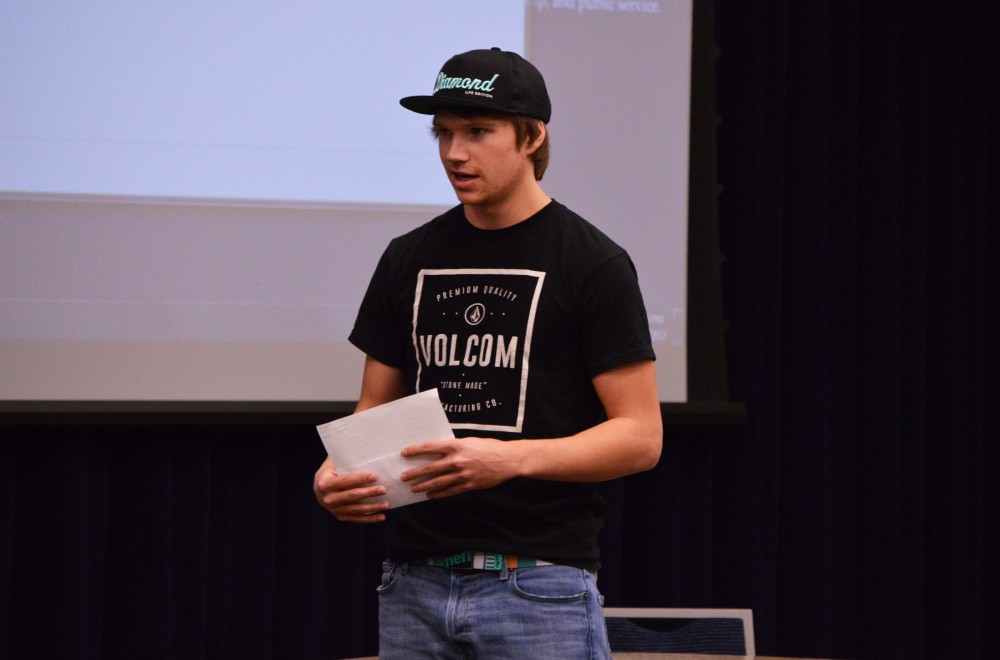Geology 300 class holds mock trial

GVL/ Hannah Zajac- Spencer Brower, gives his opening statement in the Multipurpose room on April 11th, 2017
Apr 13, 2017
As the culmination of a semester-long project, the geology 300 class at Grand Valley State University held a mock trial of the 1980s water contamination case in Woburn, Massachusetts. The mock trial was held as an open event Tuesday, April 11, in the Mary Idema Pew Library Learning and Information Commons.
The geology 300 course, “Geology and the Environment,” is an upper-level general education class taught by Peter Riemersma, associate professor of geology, that is designed to increase students’ knowledge of the intersection between science and human lives, problems and institutions.
Throughout the semester, Riemersma has been leading his students through a study of the book “A Civil Action,” which details the lawsuit filed against two corporations that were accused of polluting Woburn’s groundwater, possibly resulting in the unusual leukemia cluster in the area.
During the mock trial, Riemersma’s students acted as attorneys and expert witnesses on the plaintiffs’ and defendants’ sides. The jury consisted of students from a geology 100 class, “Environmental Geology,” who would receive extra credit for participating.
The geology 300 students had prepared elaborate exhibits, including groundwater flow maps and geological cross-sections, with data from the real case to use during the mock trial. Riemersma said one challenge for the students would be explaining these complicated exhibits to the jury.
“Part of the interesting thing is that, with a few exceptions, these people aren’t scientists,” Riemersma said. “They’ve never contoured data before, they’ve never calculated ground water flow of velocity, they’ve never made geologic cross-sections. So, they learn how to do all that stuff, (and) they have to be able to explain it to a jury, teach it to a jury and argue for their interpretation.”
Because geology 300 is a general education class, it has students from different backgrounds and majors. Riemersma said it could be challenging to put together course material for such a diverse group of students.
“One of the problems with these upper-level gen. eds is if you have people from a variety of backgrounds, some people know this, some people don’t know this, so what do you do?” Riemersma said. “Well, one thing you can do is just pick something that nobody knows anything about so everyone’s kind of on the same page. (There) are some geology majors in the class, and I think even the geology majors, after like a week or so, they’re beyond anything they have seen before, so it’s all new. It’s all new stuff to everybody.”
Ashley Newton, a student in the course who acted as an expert witness during the mock trial, said preparing for the project was a unique challenge.
“I think the hardest part is being a non-geology major and taking this on and learning new skills that comes with it,” she said. “I’m an anthropology major, so I do a lot of papers for finals’ exams, so doing this is kind of a nice little break but also challenging at the same time because you got to come up with these questions and know how to answer them.”
Riemersma said the mock trial would be an unforgettable experience for his students.
“They’re all going to remember this,” he said. “If there’s anything they remember this semester, they will remember the mock trial. So, of course, as (an) educator, you always want students to kind of remember something about your class, and I’m positive, a decade from now, they’ll remember the mock trial.”





















